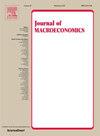Wealth in the utility function, consumption subsidy, and long-run growth and welfare
IF 1.5
3区 经济学
Q3 ECONOMICS
引用次数: 0
Abstract
This paper studies the effect of consumption subsidies on long-run growth and welfare in a Schumpeterian model with the spirit of capitalism (SOC)—wealth in the utility function. It finds that consumption subsidy promotes (reduces) long-run growth and welfare when the spirit of capitalism is weak (strong). By contrast, consumption subsidy has no effect on long-run growth in the Ramsey model of capital accumulation, whereas its effect on the level of consumption and capital stock also depends on the strength of the SOC. Consumption subsidy decreases growth in the AK model with the SOC. In quantitative analysis, we find that when the ratio of consumption subsidy to total consumption increases from 0 to 10%, long-run growth increases by about 0.044 (0.1) percentage points in China (the U.S.), and this effect decreases with the strength of the SOC. Moreover, labor tax, capital tax, and income tax are also studied and compared.
效用函数中的财富、消费补贴以及长期增长和福利
本文在一个熊彼特模型中研究了消费补贴对长期增长和福利的影响,该模型的效用函数中包含资本主义精神(SOC)-财富。研究发现,当资本主义精神较弱(较强)时,消费补贴会促进(降低)长期增长和福利。相比之下,在拉姆齐资本积累模型中,消费补贴对长期增长没有影响,而其对消费水平和资本存量的影响也取决于 SOC 的强弱。在有 SOC 的 AK 模型中,消费补贴会降低经济增长。在定量分析中,我们发现当消费补贴占总消费的比例从 0 增加到 10%时,中国(美国)的长期经济增长会增加约 0.044(0.1)个百分点,而且这种影响会随着 SOC 的强度而减小。此外,还对劳动税、资本税和所得税进行了研究和比较。
本文章由计算机程序翻译,如有差异,请以英文原文为准。
求助全文
约1分钟内获得全文
求助全文
来源期刊

Journal of Macroeconomics
ECONOMICS-
CiteScore
2.50
自引率
7.10%
发文量
53
审稿时长
76 days
期刊介绍:
Since its inception in 1979, the Journal of Macroeconomics has published theoretical and empirical articles that span the entire range of macroeconomics and monetary economics. More specifically, the editors encourage the submission of high quality papers that are concerned with the theoretical or empirical aspects of the following broadly defined topics: economic growth, economic fluctuations, the effects of monetary and fiscal policy, the political aspects of macroeconomics, exchange rate determination and other elements of open economy macroeconomics, the macroeconomics of income inequality, and macroeconomic forecasting.
 求助内容:
求助内容: 应助结果提醒方式:
应助结果提醒方式:


